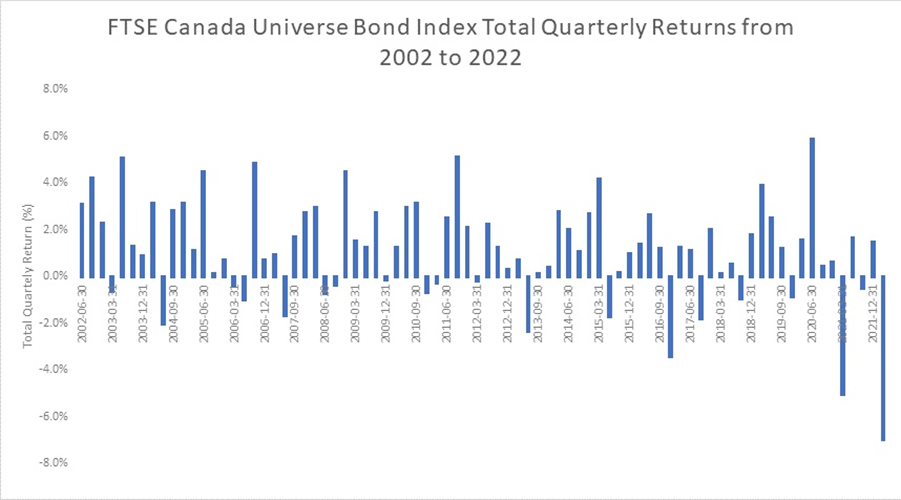Amidst an exceptional economic and geopolitical context, the bond market suffered a significant downturn during the first quarter of 2022.
The FTSE Canada Universe Bond Index, among many others, reported a quarterly return of -6.97%, as of March 31, 2022. This is the most significant drop in more than 20 years, as you can see in the graph below:
 Source: iAFG and Bloomberg
Source: iAFG and Bloomberg
Your clients may have questions about this bond market downturn: What has caused this situation? What is the outlook?
The best recommendation remains to encourage your clients to keep following their initial financial plan. Besides, here is some additional information to help you support them.
The downturn explained to your clients
To begin with, these low returns are mainly attributed to one specific factor: inflation. Here is a simplified way to explain it to your clients in a few points:
- To contain inflation, many central banks indicated their intention to raise interest rates.
- Bonds compete in the bond market based on the income they generate, which is determined by interest rates. High rates mean high bond returns and vice versa.
- As interest rates rise, bonds offering less income than the current market must depreciate to provide a total return comparable to what is offered by newly issued bonds.
- This adjustment causes the whole bond market value to drop, resulting in the negative total returns seen in the first quarter of 2022.
- Note that during a period of rising interest rates, long-term bonds are more heavily impacted than short-term or floating rate bonds* since the lower income they provide is fixed for a longer period.
Medium- and long-term perspectives
What about the perspectives for the months and years to come? To answer this question, two facts must be considered:
- Because they have higher interest rates, bonds now offer better returns to investors. Therefore, as interest rates rise, the bond asset class becomes more attractive.
- Most of the central banks' expected rate hikes are already incorporated in current bond rates. They have, therefore, already had a negative impact on the value of bonds.

These two observations suggest a different outlook for this asset class. Alexandre Morin, Senior Director, Fixed Income Portfolio Manager for iAIM, sums it all up well in his latest commentary on the subject:
"We believe that moving out of bond funds at this time would be a mistake, given the significant decline in bond prices since the beginning of the year, while these prices already incorporate several potential rate hikes by central banks."
Also note that, depending on your clients' investor profile, bonds remain a source of diversification to be considered for their portfolio.
A simple solution
Regardless of what lies ahead for the bond market, it is possible for your clients to invest in managed funds that adapt to the economic environment and provide greater investment security. For example, the Fixed Income Managed Portfolio offers this type of security by giving the portfolio manager, Alexandre Morin, the ability to choose an optimal combination and allocation of underlying funds.
For more information, you can watch this video by Sébastien Mc Mahon on the recent rate hike.
*For instance, the Short Term Bond & Floating Rate Income (Wellington Square).

